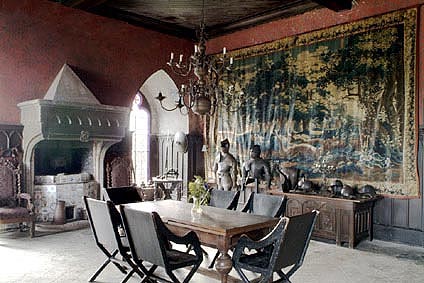|
1226 The Archbishop of Mainz and Prince Elector Siegfried of Eppenstein build Lahneck Castle to protect their territory at the mouth of the River Lahn.
1245 First official reference to Lahneck.
1298 The German King Adolph of Nassau stays at Lahneck Castle shortly before he is killed in the battle of Göllheim while fighting King Albrecht I of Austria. To revenge him, Lahneck Castle Count Friedrich Schilling of Lahnstein joins a conspiracy against King Albrecht I. He is executed in 1309 following the storming of the castle.
1312 The story of the last Knights Templar is shrouded in mystery. Following the papal order to disband, the last 12 Templars are said to have sought refuge in the castle, where they perished in a heroic fight to the death.
1332 Pope John grants a 40-day indulgence to those attending services in the castle chapel, which is dedicated to Saint Ulrich.
1338 On July 15, Prince Elector of Mainz, Archbishop Henry III sets out from Lahneck Castle to attend the gathering of the Prince Electors, which led to the Elector Assembly of Rhens.
1400 On June 4, King Wenzel is deposed by the four Rhine Prince Electors in Oberlahnstein. Together with the Prince Elector of Mainz, Castle Count Friedrich of Nuremberg stays at the castle along with many delegates sent by the cities. In Rhens, the following day, Ruprecht of the Palatinate is elected to the throne as King of the Germans.
1475 Dieter of Isenburg has the castle strengthened with two outer walls following the "Mainz bishops feud" with Count Adolph of Nassau.
1633 In the 30-Years War, the castle suffers badly at the hands of the Swedish and imperial troops. The castle loses its important role.
1774 On July 18, during his travels along the River Lahn, Goethe pens the poem Geistesgruß inspired by the sight of Lahneck Castle.
1803 As part of the secularization of the Mainz archbishopric, Lahneck Castle is granted to the Duchy of Nassau.
1850 In private ownership since then.
1907 Imperial Admiral Robert Mischke purchases Lahneck Castle. The castle has been owned by his family ever since.
Translation by Ilona Wallberg
|

